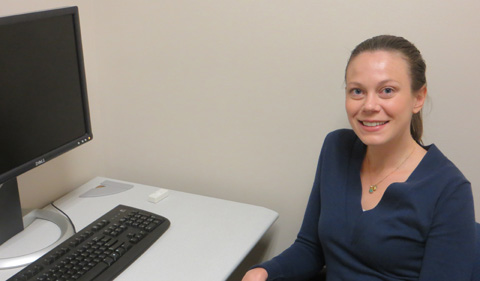By Juliana Scheiderer ’16
Why are some people more fearful than others?
What makes certain people at risk for developing anxiety disorders?
How does anxiety affect substance abuse?
These are the questions currently facing sixth-year psychology doctoral candidate Ashley Howell as she conducts her research.
“I’ve always been very fascinated by anxiety,” she said. “Fear and anxiety don’t feel good. They’re things that we need to survive and they’re something we all experience.”
An Early Interest in the Brain
Howell knew she wanted to study psychology from an early age.
“When I was in elementary school, I was fascinated with the brain. I loved learning about it. My dream jobs, growing up, all had something to do with the brain,” she explained.
Although her dream jobs ranged from neurosurgeon to psychiatrist, Howell’s passion for studying the mind never wavered.
“Ultimately, I decided on psychology because I loved the idea of giving individuals skill sets that they can work with,” she said.
Finding Support at OHIO
Howell first began studying fear and anxiety while working as an undergraduate research assistant at the University of Georgia. Her studies then led her to Ohio University, where she enrolled in the doctoral program, earning her M.S. along the way. When asked what drew her to OHIO, Howell cited the Psychology Department’s positive environment.
“With regard to the program, I was impressed with how everyone in the department seemed to be very collaborative,” she said. “It was a supportive and encouraging atmosphere, as opposed to being a competitive atmosphere.”
During her time at OHIO, Howell has been working on completing her dissertation. The project studies how different individuals categorize events as either threatening or non-threatening, as well as how this categorization may be related to problem-solving skills and day-to-day levels of anxiety.
Howell said she most appreciated the department’s supportive environment during this process. If she needed any equipment, advice or resources for the project, faculty were there to enthusiastically assist her.
“There’s a lot of stress that goes into being a graduate student” she said. “The faculty here provide us with a lot of evaluation and feedback, but also encouragement.”
Going Forward
Howell is applying to clinical psychology residency programs. After she completes her degree, she hopes to continue her work as a clinical researcher.
When asked what advice she would give to undergraduate psychology students, Howell advises consulting with graduate students, faculty members, and advisers. Establishing relationships, she says, is one of the most important things undergraduates can do.
Howell also said undergraduate students shouldn’t feel intimidated about reaching out.
“We’ve all been there,” she said. “We’ve all needed a mentor before, so we’re happy to help.”
For students still finding their path, Howell recommends taking stock of your emotions after finishing a big project.
“One way you know you’re in the right field and, you’re in it to win it, is if you stay,” she said. “If you come out of a project relieved, but you’re ready to go again, I think that’s how you know if a field is right for you.”
With regard to her own career, Howell said she didn’t just have one defining moment, but instead experienced many.
“I don’t think I’ve ever had a single ah-ha moment, rather it’s been a series of ah-ha moments and they never really end,” she said. “If you’ve gone over one hurdle and you’re ready to tackle another, you’ve found your place.”


















Comments